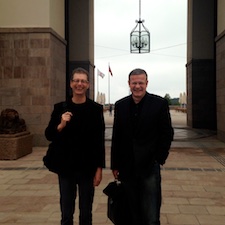June 14, 2015

Richard Bellamy (left) and Mattias Kumm at Koç University after debating “Is there Global Public Law?”
‘Is there a Global Public Law?” was the question that launched Koç University’s Center for Global Public Law’s inaugural colloquium.
Mattias Kumm and Richard Bellamy debated key questions about the scope and the theoretical foundations of existing global public law regimes and assessed the question of the future design of legitimate global institutions.
Moderated by the Center’s director Başak Çalı the colloquium was attracted a large, diverse audience composed of scholars and students from the fields of international relations, philosophy, history, and international law. This colloquium was the first of the biannual workshops that the Center for Global Public Law will hold in the coming years.
Professors Kumm and Bellamy debated key questions about the scope and the theoretical foundations of existing global public law regimes and assessed the question of the future design of legitimate global institutions. Departing from their common identification of human rights, democracy, and the rule of law as the globally shared justifications of political authority, Kumm and Bellamy outlined their divergences on the role of nation-states vis-à-vis institutions of global public law. Their approaches, as distilled during the discussion, differ with regard to purpose and scope of global public law. While Bellamy adopts a perspective on global public law that is primarily geared towards strengthening democratic governance domestically and internationally, Kumm advances an understanding of global public law as holding intrinsic value for the legitimacy of sovereign statehood. This latter view, therefore, imagines a wider scope of applications of global public law in comparison to the former’s focus on strengthening forms of democratic governance within and across states.
Professor Kumm’s presentation addressed two core points: 1, the important yet limited role of the state 2, the position of international human rights courts.
His core argument pertains to what he terms the ‘co-constitution’ of the domestic and the international. Regarding the first aspect, Professor Kumm outlined how domestic politics inevitable generates outcomes that affect the well-being of citizens living in other states. This phenomenon he calls ‘justice-sensitive externalities’ of domestic politics. According to Professor Kumm, these empirical effects surpass the exclusive authority of the singular state and are therefore normatively relevant on an international level. If norms and regimes of global public law regulate such externalities, such constraints on domestic politics do not constitute an illegitimate interference with state policies, but are rather normatively required. The legitimacy of states, therefore, cannot derive solely from the domestic authorizations of municipal laws by ‘the people’. Rather, questions of legitimate government must be thought beyond the nation-state. Human rights norms in international law are fit to provide the legitimate restraints on state politics that affect people living beyond state borders.
Professor Kumm’s approach to the first question, namely the crucial but ultimately qualified importance of the authority of the nation state also shapes his assessment of the role of international human rights courts with regard to sovereign autonomy. Against arguments that reserve the ultimate authority of shaping domestic laws to the will of ‘the people’, Professor Kumm argued that cosmopolitan standards of justice, enshrined in international law, may legitimately influence the structure and interpretation of national constitutions.
Professor Bellamy’s presentation pertained to the relationship between rights and democracy. More specifically, he evaluated the connection between international human rights courts and claims to democratic autonomy over domestic politics. Professor Bellamy argued against approaches within legal constitutionalism that consider ‘rights as trumps’ over the possible range of democratic decisions. Rather than considering democratic decision making as subordinate to the primacy of rights, Professor Bellamy mobilized arguments from the tradition of political constitutionalism that sees democracy and rights to be unified in impartial and open political procedures. Considered from such a perspective, rights structure the form of democratic procedures, while democratic processes provide the medium in which rights are realized. Once applied to the global level, this approach to the mutual imbrication of rights and democracy indicates that the use of national referenda about the transfer of constitutional authority to international human rights courts remains normatively insufficient. In order to remain legitimate on an international level, rights and their adjudication by international courts, must be embedded in democratically governed institutions beyond the nation-state.
Professor Bellamy therefore argued that the existence of international courts ought to be accompanied by what he calls a ‘demoi-cratic’ association of democratic states. Such an association would place international courts in continued cooperation with democratically elected representatives of national peoples. Such a demoi-cratic association of states would replace the one-time transfer of domestic authority to international courts by way of national referenda with an ongoing cooperation between these two institutions. From the perspective of political constitutionalism, therefore, such an arrangement would ensure that the interpretation of rights is not severed from impartial and fair democratic procedures and thereby remains connected to the democratic will of those to whom rights ultimately apply.
